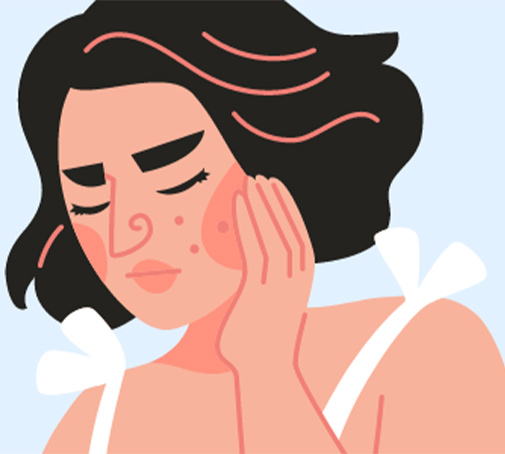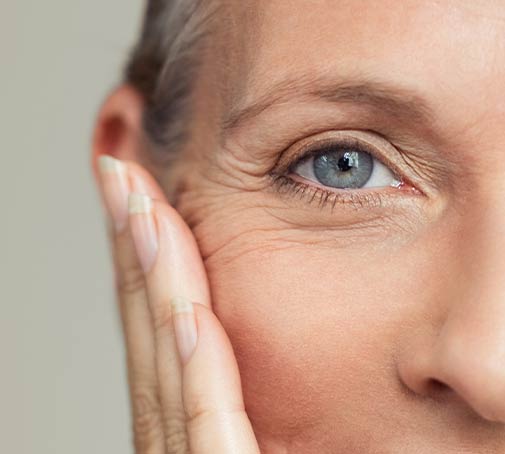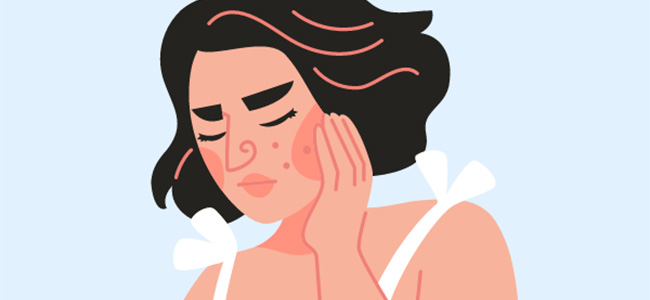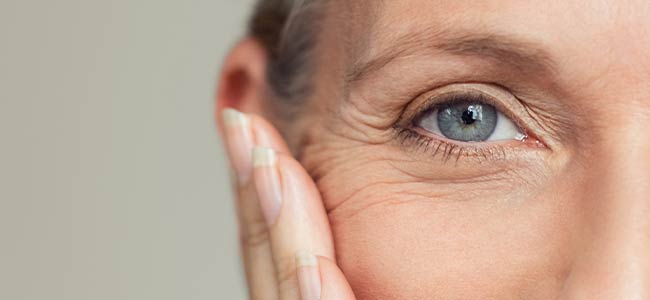
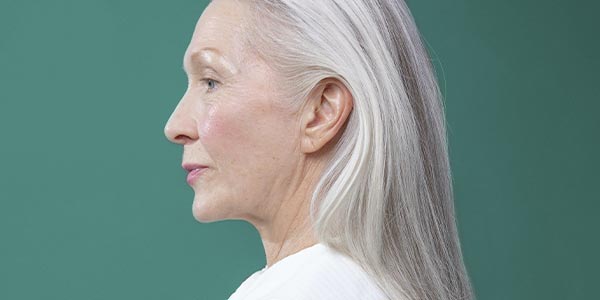
Caring for Your Skin in Menopause
Menopause – this new phase of life feels like puberty 2.0 for many people. Hormonal changes can cause the skin to break out or even lead to a rash, and the skin can get quite dry. We’ll show you the best way to support your skin during the menopause.
What causes skin problems during the menopause?
Menopause typically occurs around the age of 50, but this is only an average. A few years before or after is also completely normal. The process that the body goes through during this time is very individual. Some women complain of a range of symptoms, while others have hardly any issues at all. The most common symptoms include hot flashes, an irregular menstrual cycle, mood swings and changes in the appearance of the skin. We will now take a closer look at the latter.


During natural skin aging, many of the body’s processes begin to change. Skin renewal slows down and hyaluronic acid production decreases. Estrogen levels also change. Estrogens are female hormones that play an important role in maintaining beautiful, youthful skin. They influence the metabolism of our skin cells and promote collagen production, which improves skin elasticity. Collagen is a protein that provides structural support to the skin. These changes within the body during the menopause gradually become visible and noticeable: The skin becomes thinner and loses elasticity. It becomes harder for the skin to retain moisture and produce hyaluronic acid, which leads to drier skin and a dull complexion. The effectiveness of skin repair mechanisms declines, which can promote the appearance of dark spots or age spots. These can all be typical symptoms of the menopause.
Maintain a healthy lifestyle
In addition to factors like genetic predisposition and proper skincare, it is also worth living a healthy lifestyle. This includes a balanced diet with plenty of antioxidants. The most important antioxidants include vitamin C and selenium. Always remember to drink plenty of fluids. As we age, we tend to feel less thirsty, while the need for fluids increases. Drinking lots of water will also make the skin appear fresher, plumper and more youthful.
Protect your skin from UV radiation. Mature skin is more sensitive to the sun. UV rays can also trigger hyperpigmentation and wrinkles.
Regular exercise is extremely important for your overall well-being and stress reduction. Stress can be a cause of hormonal imbalance and can even trigger allergic reactions, leading to itching and rashes. Stress can also increase sebum production, which leads to clogged pores and pimples. Hormonal breakouts can become a real problem for some women during the menopause. If more and more breakouts and inflamed blemishes appear on your face, you might even suffer from acne tarda (adult acne). If you think you may have this condition, please consult your dermatologist and get advice on the right treatment.
Caring for mature skin
When your hormones go crazy, so does your skin. Age-related skin changes can manifest in various ways.
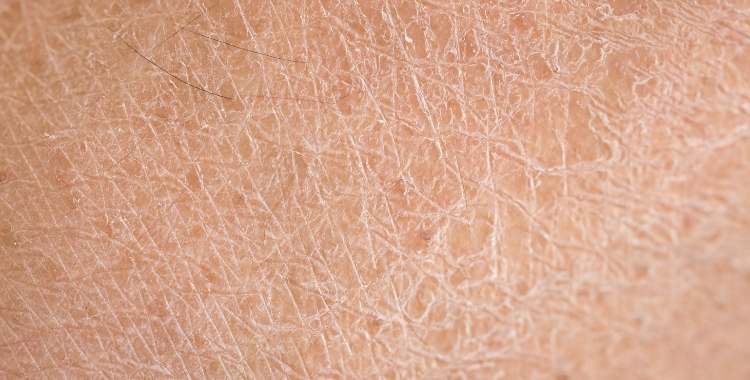

Dry skin
First you need to find out why your skin is dry. It is lacking water or lipids? We recommend different skincare products depending on the cause. If you have dehydrated skin, you can use our HYALURONIC UREA skincare collection. Do you need a powerful boost of hydration? Then add our Triple Hyaluronic Booster into your skincare routine, so dry patches on your face no longer stand a chance. Your complexion appears dull and tired? Our Q10 products give the skin new energy, promote cell activity, support skin renewal and replenish lipids in the skin. Very dry skin on the body can be treated with our Anti-Aging Body Butter. Regular exfoliation removes dead skin cells and make the skin more receptive to the ingredients of other products.
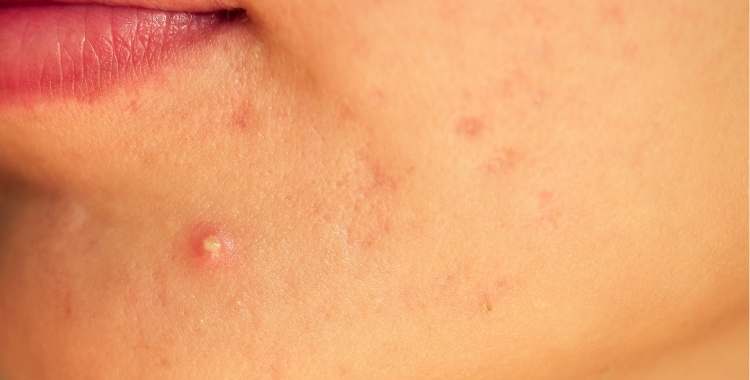

Blemish-prone skin
Your skin is suddenly acting up and you are struggling with blemishes, blackheads and oily skin? The products from our OYSTER collection brings your skin back into balance. They have a pore-refining effect, regulate sebum production in the long term and reduce blackheads and clogged pores. Our SOS Anti-Blemish Concentrate is a quick remedy for pimples with an anti-inflammatory effect. Avoid drying products that strip the skin of moisture. They are not a solution for oily skin. On the contrary, they can even stimulate sebum production. Alcohol-free products, such as our DERMA CONTROL toner, are a good choice.
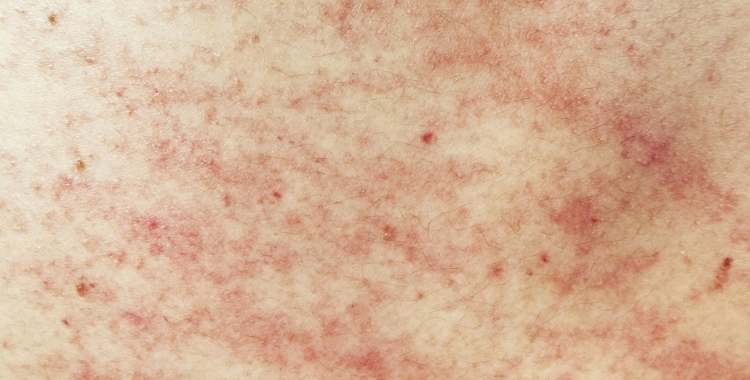

Sensitive skin
Skin rashes, red patches, itching and allergies have suddenly appeared out of nowhere? Possible causes include a damaged skin barrier, which makes your skin more susceptible to allergies. Our SENSITIVE CARE collection strengthens the skin barrier and has a long-lasting soothing effect. To top it all off, you can also use the Triple Ceramide Serum. It helps repair damaged skin and reduces facial redness. The formulation is fragrance-free and very gentle on the skin. Important: If redness with severe itching or even severe pain persists, you should make an appointment with your dermatologist. A skin rash can also be a sign of conditions such as perioral dermatitis, atopic dermatitis or hives (urticaria) – if it is accompanied by blisters and itchy skin all over the body.
Menopausal eczema
The drop in estrogen levels during the menopause not only has a negative effect on collagen production, but can also be the cause of increased sensitivity to irritants. As a result, the skin can have an intense reaction and develop eczema. Eczema is one of the most common skin conditions, affecting almost everyone at some point in their life. You can recognize it by a variety of symptoms: In addition to severe redness, itching, scaly skin and a rash with blisters, the symptoms can also include cracks and skin fissures. If you are affected, you should definitely consult a dermatologist and seek advice on suitable treatment.
Tips for make-up
In the first step, make sure that you have the right base. The Caviar Anti-Aging Ampoule provides the skin with important nutrients and creates a perfect make-up base. Our EXTREME LIFT Anti-Wrinkle Serum leaves an instant firming effect and can be used either before or after your moisturizer. Then follow with a smoothing primer to prevent the foundation or concealer from settling into wrinkles.


Beauty editor




